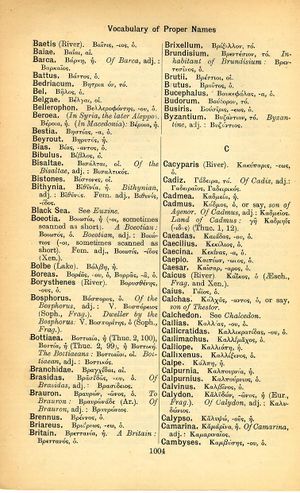Byzantium
Κινδυνεύουσι γὰρ ὅσοι τυγχάνουσιν ὀρθῶς ἁπτόμενοι φιλοσοφίας λεληθέναι τοὺς ἄλλους ὅτι οὐδὲν ἄλλο αὐτοὶ ἐπιτηδεύουσιν ἢ ἀποθνῄσκειν τε καὶ τεθνάναι → Actually, the rest of us probably haven't realized that those who manage to pursue philosophy as it should be pursued are practicing nothing else but dying and being dead (Socrates via Plato, Phaedo 64a.5)
English > Greek (Woodhouse)
Βυζάντιον, τό.
Byzantine, adj.: Βυζάντιος.
Latin > English (Lewis & Short)
Bȳzantĭum: ii, n., = Βυζάντιον,
I a city in Thrace, on the Bosphorus, opposite the Asiatic Chalcedon, later Constantinopolis, now Constantinople; among the Turks, Istamboul or Stamboul (i.e. εις τὴν πόλιν), Mel. 2, 2, 6; Plin. 4, 11, 18, § 46; 9, 15, 20, § 50 sq.; Nep. Paus. 2, 2; Liv. 38, 16, 3 sq.; Tac. A. 12, 63 sq.; id. H. 2. 83; 3, 47 al.—
II Derivv.
A Bȳzantĭus, a, um, adj., of Byzantium, Byzantine: litora, the Strait of Constantinople, Ov. Tr. 1, 10, 31: portus, Plin. 9, 15, 20, § 51.—Subst.: Bȳ-zantĭi, ōrum, m., the inhabitants of Byzantium, Cic. Prov. Cons. 3, 5; 4, 6 sq.; id. Verr. 2, 2, 31, § 76; Nep. Timoth. 1, 2; Liv. 32, 33, 7.—
B Bȳzantĭăcus, a, um, adj., of Byzantium: lacerti, Stat. S. 4, 9, 13. —
C Bȳzantīnus, a, um, adj., the same (post-class.): Lygos, Aus. Clar. Urb. 2: frigora, Sid. Ep. 7, 17.
Latin > French (Gaffiot 2016)
Byzantĭum¹² (-tĭŏn), ĭī, n. (Βυζάντιον), Byzance [postérieurement Constantinople, ville sur le Bosphore de Thrace] : Cic. Sest. 56 ; Domo 52 ; Liv. 38, 16, 3 || -tĭăcus Stat. S. 4, 9, 13 ; -tīnus Tert. Scap. 3 ; -tĭus, a, um Cic. Domo 129 ; Hor. S. 2, 4, 66, de Byzance, byzantin || Byzantĭī, ōrum, m., habitants de Byzance : Cic. Verr. 2, 2, 76.

